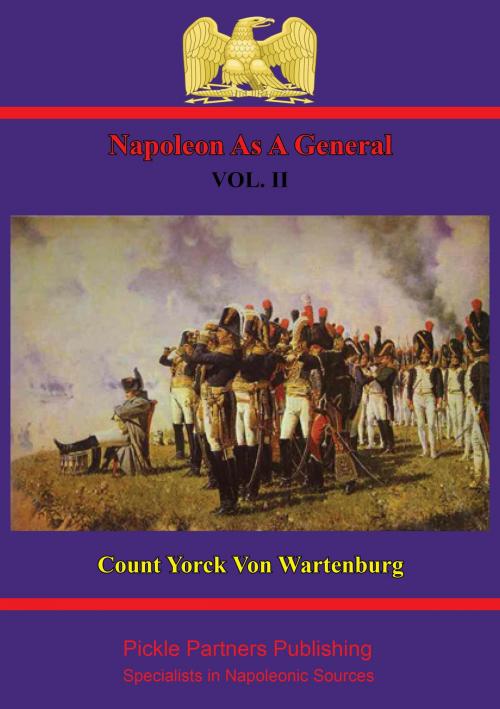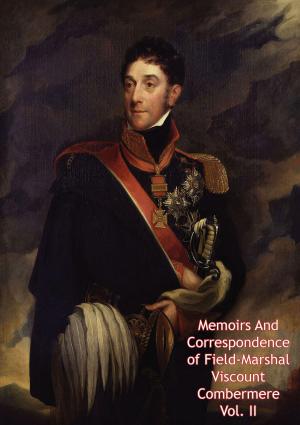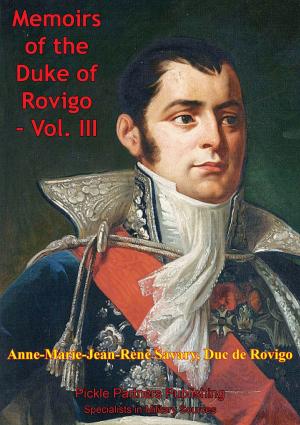| Author: | Field Marshal Count Maximilian Yorck von Wartenburg | ISBN: | 9781782891550 |
| Publisher: | Wagram Press | Publication: | June 13, 2014 |
| Imprint: | Wagram Press | Language: | English |
| Author: | Field Marshal Count Maximilian Yorck von Wartenburg |
| ISBN: | 9781782891550 |
| Publisher: | Wagram Press |
| Publication: | June 13, 2014 |
| Imprint: | Wagram Press |
| Language: | English |
A complete analysis of Napoleon Bonaparte as a general. Possibly the best analysis ever written, and the source book for many later works.
There are many books about Napoleon, and some of them attempt to analyse his particular brand of military genius. Almost all these books owe a tremendous debt to Colonel Count Yorck von Wartenburg. His book was published at the end of the nineteenth Century and is still as important today; indeed, Dr David Chandler acknowledges that he used the book as one of the primary works when researching his momentous history of Napoleon. After a brief look at Napoleon’s youth and early career Wartenburg sets out Napoleon’s military exploits chronologically, beginning with the campaign in Italy, and the battles for Mantua. The first volume then describes the campaigns in Egypt and Syria before giving an account of the first of Napoleon’s great battles: Marengo. Ulm, Austerlitz, Jena, Eylau and Friedland complete Volume I.
Volume II covers Spain, Ratisbon, Wagram and the ill-fated invasion of Russia. After Moscow and the Beresina crossing came the armistice, and then Dresden and Leipzig. The book ends with the exile of Napoleon for the last time after his defeat at Waterloo. The writing is always clear and uncomplicated, suiting a description of twenty years in Europe which threw the political map into confusion, and had as legacy the mistrust between France and the remainder of the continent, and the growth of Prussian military might and British complacency in military matters.
A complete analysis of Napoleon Bonaparte as a general. Possibly the best analysis ever written, and the source book for many later works.
There are many books about Napoleon, and some of them attempt to analyse his particular brand of military genius. Almost all these books owe a tremendous debt to Colonel Count Yorck von Wartenburg. His book was published at the end of the nineteenth Century and is still as important today; indeed, Dr David Chandler acknowledges that he used the book as one of the primary works when researching his momentous history of Napoleon. After a brief look at Napoleon’s youth and early career Wartenburg sets out Napoleon’s military exploits chronologically, beginning with the campaign in Italy, and the battles for Mantua. The first volume then describes the campaigns in Egypt and Syria before giving an account of the first of Napoleon’s great battles: Marengo. Ulm, Austerlitz, Jena, Eylau and Friedland complete Volume I.
Volume II covers Spain, Ratisbon, Wagram and the ill-fated invasion of Russia. After Moscow and the Beresina crossing came the armistice, and then Dresden and Leipzig. The book ends with the exile of Napoleon for the last time after his defeat at Waterloo. The writing is always clear and uncomplicated, suiting a description of twenty years in Europe which threw the political map into confusion, and had as legacy the mistrust between France and the remainder of the continent, and the growth of Prussian military might and British complacency in military matters.












![Cover of the book The Life of Nelson - Vol. I [Illustrated Edition] by Field Marshal Count Maximilian Yorck von Wartenburg](https://www.kuoky.com/images/2011/february/300x300/9781908692412-igWY_300x.jpg)


